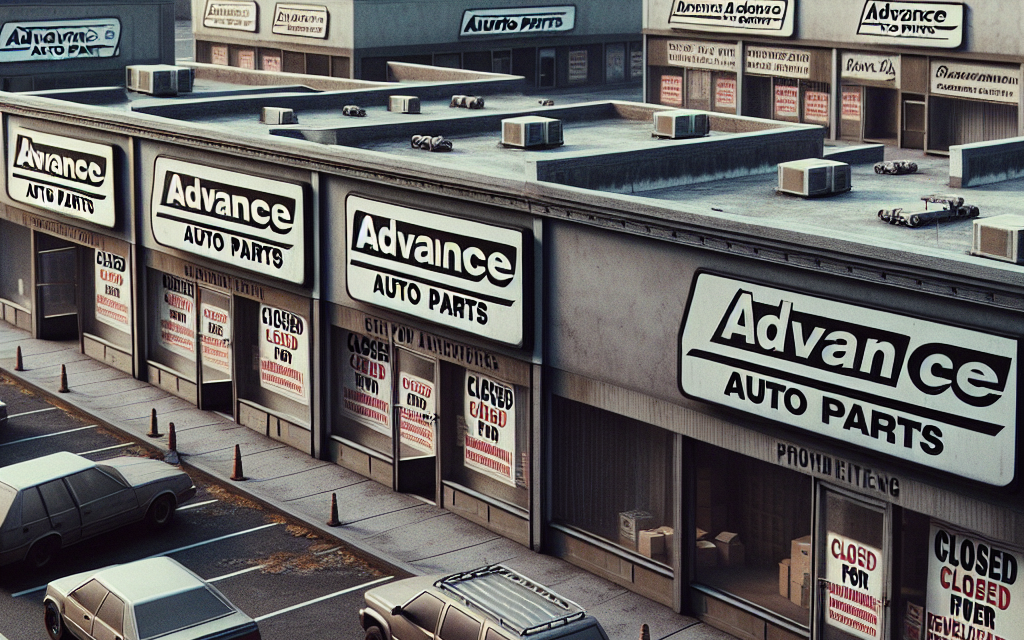“Streamlining for Success: Advance Auto Parts Revamps with Strategic Store Closures”
Introduction
Advance Auto Parts, a leading automotive aftermarket parts provider, has announced the closure of hundreds of its retail locations as part of a strategic initiative to revitalize its business operations. This significant move comes amid ongoing challenges in the retail sector and aims to streamline the company’s operations, enhance efficiency, and focus on more profitable markets. By consolidating its store footprint, Advance Auto Parts seeks to optimize its resources, improve customer service, and strengthen its competitive position in the automotive parts industry. The decision reflects the company’s commitment to adapting to changing market dynamics and ensuring long-term growth and sustainability.
Impact Of Store Closures On Local Communities
The recent decision by Advance Auto Parts to shut down hundreds of its stores has sent ripples through local communities across the nation. This strategic move, aimed at revitalizing the company’s business operations, has significant implications for the areas that host these stores. As the company seeks to streamline its operations and focus on more profitable locations, the closures inevitably lead to a range of economic and social consequences for the affected communities.
Firstly, the immediate impact of these closures is the loss of jobs. Employees who have dedicated years to serving their communities through these stores now face the uncertainty of unemployment. This not only affects the individuals directly involved but also their families and the local economy. The loss of income for these workers can lead to decreased spending in other local businesses, creating a ripple effect that can further strain the economic fabric of the community. Moreover, the closure of a store often means the loss of a familiar and convenient resource for local residents who rely on it for their automotive needs.
In addition to the economic impact, there is a social dimension to consider. Local auto parts stores often serve as more than just retail outlets; they are community hubs where residents gather, share advice, and build relationships. The closure of these stores can lead to a sense of loss and disconnection within the community. For many, these stores are not just places to purchase parts but are integral to their daily lives, providing a sense of continuity and support. The absence of such a community fixture can leave a void that is not easily filled by larger, impersonal chain stores or online retailers.
Furthermore, the closures may disproportionately affect rural and underserved areas where alternative options are limited. In these regions, the presence of an Advance Auto Parts store can be crucial, providing essential services and products that are otherwise difficult to access. The removal of such a resource can exacerbate existing challenges faced by these communities, such as limited transportation options and fewer employment opportunities. This can lead to increased isolation and a further decline in the quality of life for residents.
However, it is important to recognize that the decision to close these stores is part of a broader strategy by Advance Auto Parts to ensure long-term sustainability and competitiveness. By focusing on more profitable locations and investing in digital and e-commerce capabilities, the company aims to better serve its customers and adapt to changing market dynamics. While this may offer benefits in terms of improved service and product availability, it also highlights the growing trend of businesses prioritizing efficiency and profitability over local presence.
In conclusion, the closure of hundreds of Advance Auto Parts stores has a profound impact on local communities, affecting both the economic and social landscape. While the company’s strategy may be necessary for its survival in a competitive market, it underscores the challenges faced by communities that lose vital local resources. As these areas grapple with the consequences, it is crucial for stakeholders, including local governments and community organizations, to explore ways to mitigate the impact and support affected individuals and businesses. Through collaborative efforts, it may be possible to foster resilience and adaptation in the face of such significant changes.
Strategies For Revitalizing A Retail Business
In the ever-evolving landscape of retail, businesses must continuously adapt to changing market conditions and consumer preferences. Advance Auto Parts, a leading automotive aftermarket parts provider, recently announced the closure of hundreds of its stores as part of a strategic initiative to revitalize its business. This decision underscores the importance of implementing effective strategies to ensure long-term sustainability and growth in a competitive industry. By examining the rationale behind such a move, other retailers can glean valuable insights into how to navigate similar challenges.
One of the primary reasons for Advance Auto Parts’ decision to close a significant number of its stores is the need to optimize its operational efficiency. In today’s retail environment, maintaining a large number of physical locations can be financially burdensome, especially when some stores underperform. By consolidating its store footprint, the company aims to reduce overhead costs and allocate resources more effectively. This approach allows the business to focus on its most profitable locations, thereby enhancing overall financial performance. Moreover, it enables the company to invest in other areas that can drive growth, such as technology and customer service.
In addition to cost optimization, the closures are part of a broader strategy to enhance the customer experience. As consumer expectations continue to evolve, retailers must prioritize delivering a seamless and personalized shopping experience. By concentrating efforts on fewer stores, Advance Auto Parts can ensure that each location is better equipped to meet customer needs. This includes improving inventory management to ensure that popular products are always in stock and enhancing staff training to provide superior customer service. Furthermore, the company can leverage data analytics to gain insights into customer preferences and tailor its offerings accordingly.
Another critical aspect of revitalizing a retail business is embracing digital transformation. In recent years, there has been a significant shift towards online shopping, a trend accelerated by the global pandemic. Recognizing this, Advance Auto Parts is likely to invest in its e-commerce platform to capture a larger share of the digital market. By enhancing its online presence, the company can reach a broader audience and offer customers the convenience of shopping from anywhere at any time. This digital focus not only complements the physical store experience but also provides an opportunity to engage with tech-savvy consumers who prefer online interactions.
Furthermore, strategic partnerships and collaborations can play a vital role in revitalizing a retail business. By aligning with other companies in the automotive industry, Advance Auto Parts can expand its product offerings and tap into new customer segments. Such partnerships can also facilitate the sharing of resources and expertise, leading to innovative solutions that benefit both parties. Additionally, collaborating with technology firms can help the company integrate advanced tools and systems that streamline operations and enhance customer engagement.
In conclusion, the decision by Advance Auto Parts to shut down hundreds of stores is a calculated move aimed at revitalizing its business in a rapidly changing retail environment. By focusing on operational efficiency, enhancing the customer experience, embracing digital transformation, and exploring strategic partnerships, the company is positioning itself for sustainable growth. These strategies serve as a valuable blueprint for other retailers facing similar challenges, highlighting the importance of adaptability and innovation in achieving long-term success. As the retail landscape continues to evolve, businesses that proactively implement such strategies will be better equipped to thrive in the face of adversity.
The Future Of Auto Parts Retail In A Digital Age
In an era where digital transformation is reshaping industries across the globe, the auto parts retail sector is no exception. Recently, Advance Auto Parts, a leading player in this field, announced the closure of hundreds of its stores as part of a strategic initiative to revitalize its business. This decision underscores the broader challenges and opportunities facing the auto parts retail industry in the digital age. As consumer preferences shift and technology evolves, companies like Advance Auto Parts are compelled to adapt to remain competitive.
The closure of these stores is not merely a reaction to declining foot traffic but rather a calculated move to streamline operations and focus on more profitable avenues. In recent years, the rise of e-commerce has significantly altered the retail landscape, with consumers increasingly opting for the convenience of online shopping. This trend has been particularly pronounced in the auto parts sector, where customers can easily compare prices, read reviews, and have products delivered directly to their doorsteps. Consequently, brick-and-mortar stores have faced mounting pressure to justify their existence in a digital-first world.
Advance Auto Parts’ decision to shutter a portion of its physical locations is part of a broader strategy to enhance its digital capabilities and improve customer experience. By reallocating resources from underperforming stores to its online platform, the company aims to bolster its e-commerce presence and better serve the needs of modern consumers. This shift is indicative of a larger industry trend, as auto parts retailers increasingly invest in technology to streamline operations and offer a seamless omnichannel experience.
Moreover, the integration of digital tools and data analytics is enabling companies to optimize inventory management and personalize marketing efforts. By leveraging these technologies, retailers can gain valuable insights into consumer behavior, allowing them to tailor their offerings and promotions to meet the specific needs of their customers. This data-driven approach not only enhances customer satisfaction but also drives sales and profitability.
In addition to enhancing their digital platforms, auto parts retailers are also exploring innovative ways to engage with customers. For instance, some companies are investing in augmented reality (AR) and virtual reality (VR) technologies to provide immersive shopping experiences. These tools allow customers to visualize how parts will fit into their vehicles, thereby reducing the likelihood of returns and increasing customer confidence in their purchases.
Furthermore, the rise of electric vehicles (EVs) presents both challenges and opportunities for the auto parts industry. As EVs become more prevalent, the demand for traditional auto parts may decline, prompting retailers to diversify their product offerings. Companies that can successfully pivot to accommodate the needs of EV owners will be well-positioned to thrive in this evolving market.
In conclusion, the decision by Advance Auto Parts to close hundreds of stores is a reflection of the broader transformation occurring within the auto parts retail industry. As digital technologies continue to reshape consumer expectations and market dynamics, retailers must adapt to remain relevant. By embracing e-commerce, leveraging data analytics, and exploring innovative customer engagement strategies, companies can navigate the challenges of the digital age and seize new opportunities for growth. The future of auto parts retail lies in the ability to blend the physical and digital realms, creating a seamless and personalized experience for consumers.
Lessons Learned From Advance Auto Parts’ Restructuring

In the ever-evolving landscape of the automotive aftermarket industry, Advance Auto Parts has recently made headlines with its decision to shut down hundreds of stores as part of a strategic restructuring effort. This move, while drastic, offers a wealth of lessons for businesses navigating the complexities of modern retail. The decision to close a significant number of stores is not merely a reactionary measure but a calculated step towards revitalizing the company’s overall business model. By examining the factors that led to this decision and the potential outcomes, other businesses can glean valuable insights into the importance of adaptability and strategic foresight.
One of the primary lessons from Advance Auto Parts’ restructuring is the critical need for businesses to remain agile in the face of changing market dynamics. The automotive aftermarket industry, like many others, has been significantly impacted by shifts in consumer behavior, technological advancements, and economic fluctuations. As consumers increasingly turn to online platforms for their purchasing needs, traditional brick-and-mortar stores face mounting pressure to adapt or risk obsolescence. Advance Auto Parts’ decision to close underperforming locations underscores the necessity for businesses to continuously evaluate their operational footprint and make data-driven decisions to optimize their resources.
Moreover, the restructuring highlights the importance of focusing on core competencies and streamlining operations. By closing stores that are not meeting performance expectations, Advance Auto Parts can redirect its resources towards enhancing its digital presence and improving customer experience. This strategic pivot allows the company to concentrate on areas where it can deliver the most value, thereby strengthening its competitive position in the market. For other businesses, this serves as a reminder to regularly assess their strengths and weaknesses, ensuring that they allocate resources effectively to areas that align with their long-term objectives.
In addition to operational efficiency, the restructuring of Advance Auto Parts emphasizes the significance of innovation and embracing technological advancements. As part of its revitalization strategy, the company is likely to invest in digital tools and platforms that enhance customer engagement and streamline supply chain operations. This forward-thinking approach not only positions Advance Auto Parts to better meet the evolving needs of its customers but also sets a precedent for other businesses to follow. By leveraging technology to drive innovation, companies can create more personalized and efficient experiences for their customers, ultimately fostering loyalty and driving growth.
Furthermore, the decision to close stores serves as a poignant reminder of the importance of effective communication and transparency with stakeholders. In times of significant change, maintaining open lines of communication with employees, customers, and investors is crucial to managing expectations and minimizing disruptions. Advance Auto Parts’ restructuring process provides a case study in the value of clear and consistent messaging, ensuring that all parties are informed and aligned with the company’s strategic vision.
In conclusion, the restructuring of Advance Auto Parts offers a multitude of lessons for businesses across industries. By prioritizing agility, focusing on core competencies, embracing innovation, and maintaining transparent communication, companies can navigate the challenges of a rapidly changing market landscape. As businesses strive to remain competitive and relevant, the experiences of Advance Auto Parts serve as a valuable guide for those seeking to adapt and thrive in an increasingly complex world.
How Store Closures Affect Employee Morale And Retention
The recent decision by Advance Auto Parts to shut down hundreds of its stores has sent ripples through the automotive retail industry, raising significant concerns about employee morale and retention. As the company embarks on this strategic move to revitalize its business, it is crucial to examine the implications for its workforce, which is often the backbone of any retail operation. Store closures, while sometimes necessary for financial restructuring, can have profound effects on employees, both those who are directly impacted by the closures and those who remain with the company.
Firstly, the announcement of store closures often leads to a climate of uncertainty and anxiety among employees. Those working in stores slated for closure face the immediate threat of job loss, which can be a significant source of stress. This uncertainty can lead to decreased morale as employees grapple with the potential loss of income and the challenges of finding new employment. Moreover, the psychological impact of losing a job can be profound, affecting not only the individual but also their families and communities.
For employees who remain with the company, the effects can be equally challenging. The closure of stores can lead to increased workloads as remaining locations absorb the business from shuttered outlets. This can result in longer hours and added responsibilities, which may not always be accompanied by commensurate increases in compensation. Consequently, this can lead to burnout and decreased job satisfaction, further eroding morale.
In addition to workload concerns, remaining employees may also experience a sense of insecurity about their own job stability. Witnessing colleagues lose their jobs can create a pervasive sense of vulnerability, leading to decreased trust in the company’s leadership and strategic direction. This can be particularly damaging in a retail environment where employee engagement and customer service are critical to success.
To mitigate these negative effects, it is essential for companies like Advance Auto Parts to implement comprehensive support measures for their employees. Transparent communication is paramount; employees need to be informed about the reasons behind store closures and the long-term vision for the company. Providing clear and consistent information can help alleviate some of the uncertainty and build trust in the leadership’s decision-making process.
Furthermore, offering support services such as career counseling, job placement assistance, and severance packages can help ease the transition for those affected by store closures. For remaining employees, investing in training and development opportunities can enhance skills and provide a sense of career progression, which can be a powerful motivator and retention tool.
Additionally, fostering a positive workplace culture that emphasizes teamwork and support can help maintain morale during challenging times. Encouraging open dialogue and feedback can empower employees, making them feel valued and heard, which can be crucial in maintaining engagement and loyalty.
In conclusion, while the closure of hundreds of stores by Advance Auto Parts is a strategic move aimed at revitalizing the business, it is imperative to consider the impact on employee morale and retention. By prioritizing transparent communication, offering support services, and fostering a positive workplace culture, the company can navigate these challenges more effectively. Ultimately, a committed and motivated workforce will be essential in driving the company’s future success and ensuring that it emerges stronger from this period of transformation.
The Role Of E-commerce In The Auto Parts Industry
In recent years, the auto parts industry has witnessed a significant transformation, largely driven by the rapid growth of e-commerce. This shift has not only altered consumer purchasing behaviors but has also compelled traditional brick-and-mortar retailers to reassess their business strategies. A prime example of this evolution is the recent decision by Advance Auto Parts to shut down hundreds of its physical stores in an effort to revitalize its business. This move underscores the increasing importance of e-commerce in the auto parts sector and highlights the challenges and opportunities that come with it.
The rise of e-commerce has fundamentally changed how consumers shop for auto parts. With the convenience of online shopping, customers can now easily compare prices, read reviews, and have products delivered directly to their doorstep. This has led to a growing preference for online purchases, particularly among tech-savvy consumers who value efficiency and accessibility. As a result, traditional auto parts retailers have faced mounting pressure to adapt to this new landscape or risk becoming obsolete.
Advance Auto Parts’ decision to close a significant number of its stores is a strategic response to these changing market dynamics. By reducing its physical footprint, the company aims to streamline operations and allocate more resources towards enhancing its online presence. This shift is not merely about cutting costs; it is a calculated effort to align with the evolving preferences of modern consumers. By investing in e-commerce capabilities, Advance Auto Parts seeks to offer a seamless and integrated shopping experience that caters to the needs of today’s digital-savvy customers.
Moreover, the transition to e-commerce presents several advantages for auto parts retailers. Firstly, it allows for a broader reach, enabling companies to tap into new markets and customer segments that were previously inaccessible through physical stores alone. Additionally, online platforms provide valuable data insights that can be leveraged to personalize marketing efforts and improve customer engagement. This data-driven approach not only enhances customer satisfaction but also fosters brand loyalty in an increasingly competitive market.
However, the shift towards e-commerce is not without its challenges. For traditional retailers like Advance Auto Parts, the transition requires significant investment in technology and infrastructure to support online operations. This includes developing user-friendly websites, optimizing supply chain logistics, and ensuring efficient delivery services. Furthermore, companies must also address cybersecurity concerns to protect customer data and maintain trust in their online platforms.
Despite these challenges, the potential benefits of embracing e-commerce are substantial. As the auto parts industry continues to evolve, companies that successfully integrate online and offline channels are likely to emerge as leaders in the market. This omnichannel approach not only enhances customer convenience but also provides a competitive edge by offering a comprehensive and cohesive shopping experience.
In conclusion, the decision by Advance Auto Parts to close hundreds of stores is a testament to the transformative impact of e-commerce on the auto parts industry. As consumer preferences continue to shift towards online shopping, traditional retailers must adapt to remain relevant. By embracing e-commerce, companies can unlock new growth opportunities and better serve the needs of their customers. While the transition may pose challenges, the potential rewards make it a necessary step for those looking to thrive in the digital age.
Analyzing The Financial Implications Of Store Shutdowns
Advance Auto Parts, a prominent player in the automotive aftermarket industry, recently announced the closure of hundreds of its retail locations as part of a strategic initiative to revitalize its business operations. This decision, while significant, is not entirely unprecedented in the retail sector, where companies often resort to store closures as a means to streamline operations and enhance financial performance. The financial implications of such a move are multifaceted, affecting not only the company’s bottom line but also its stakeholders, including employees, customers, and investors.
To begin with, the immediate financial impact of shutting down stores involves substantial costs. These include expenses related to severance packages for employees, lease termination fees, and the write-down of inventory and fixed assets. However, these upfront costs are often viewed as necessary investments to achieve long-term financial stability. By closing underperforming locations, Advance Auto Parts aims to reduce operational inefficiencies and redirect resources towards more profitable ventures. This strategic reallocation of resources is expected to enhance the company’s overall financial health by improving profit margins and cash flow.
Moreover, the store closures are likely to have a significant impact on the company’s revenue streams. While the reduction in the number of retail outlets may lead to a short-term decline in sales, the company anticipates that this will be offset by increased sales in remaining locations and through its online platform. The shift towards e-commerce is a critical component of Advance Auto Parts’ revitalization strategy, as it aligns with broader industry trends and consumer preferences. By investing in digital infrastructure and enhancing its online presence, the company aims to capture a larger share of the growing online automotive parts market, thereby compensating for the loss of revenue from closed stores.
In addition to these direct financial implications, the store closures also have broader economic consequences. For instance, the reduction in physical retail locations may lead to job losses, which can have a ripple effect on local economies. However, Advance Auto Parts has indicated its commitment to supporting affected employees through job placement assistance and retraining programs. This approach not only mitigates the negative impact on the workforce but also helps maintain the company’s reputation as a responsible corporate citizen.
From an investor’s perspective, the decision to close stores can be seen as a proactive measure to enhance shareholder value. By focusing on core operations and eliminating underperforming assets, Advance Auto Parts is positioning itself for sustainable growth in a competitive market. Investors are likely to view this move favorably, as it demonstrates the company’s commitment to financial discipline and strategic agility. Furthermore, the anticipated improvements in profitability and cash flow could lead to increased dividends and share buybacks, thereby providing additional returns to shareholders.
In conclusion, the closure of hundreds of stores by Advance Auto Parts represents a significant strategic shift aimed at revitalizing the company’s business operations. While the immediate financial implications involve considerable costs and potential revenue loss, the long-term benefits are expected to outweigh these challenges. By streamlining operations, investing in digital capabilities, and focusing on core strengths, Advance Auto Parts is poised to enhance its financial performance and maintain its competitive edge in the automotive aftermarket industry. As the company navigates this transition, its ability to effectively manage the associated financial and economic impacts will be crucial to its success.
Q&A
1. **Why is Advance Auto Parts shutting down stores?**
Advance Auto Parts is shutting down stores as part of a strategic plan to revitalize its business, streamline operations, and focus on more profitable locations.
2. **How many stores are being closed by Advance Auto Parts?**
The exact number of store closures can vary, but reports suggest that hundreds of stores are being shut down as part of the restructuring effort.
3. **What is the main goal of Advance Auto Parts’ restructuring plan?**
The main goal is to improve financial performance, enhance operational efficiency, and better position the company for long-term growth.
4. **Will employees be affected by the store closures?**
Yes, employees at the affected locations may face layoffs or transfers to other stores, depending on the company’s plans and available opportunities.
5. **How will the store closures impact Advance Auto Parts’ market presence?**
While the closures may reduce the company’s physical footprint, the focus is on strengthening remaining locations and potentially expanding online and service offerings.
6. **Is Advance Auto Parts planning to invest in other areas after the closures?**
Yes, the company may invest in digital infrastructure, supply chain improvements, and enhancing customer service to drive future growth.
7. **What challenges led to the decision to close stores?**
Challenges such as declining sales, increased competition, and the need to optimize resources likely contributed to the decision to close underperforming stores.
Conclusion
Advance Auto Parts’ decision to shut down hundreds of stores is a strategic move aimed at revitalizing its business operations. By closing underperforming locations, the company can streamline its operations, reduce costs, and focus resources on more profitable areas. This restructuring effort is likely intended to enhance overall efficiency, improve customer service, and strengthen the company’s competitive position in the automotive aftermarket industry. While the closures may present short-term challenges, they are part of a broader strategy to ensure long-term sustainability and growth.





